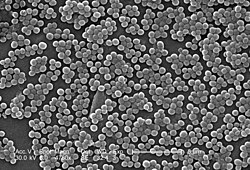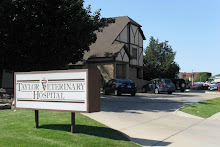 |
| MRSA colonies |
There always seems to be one topic that sticks with you and haunts you after attending an informative continuing education meeting. After the fall Iowa Veterinary Medical Association meeting last week in Ames, MRSA was the bug that really had me bugged after the meeting. MRSA stands for Methicillin Resistant Staphylococcus aureus. This nasty bacteria has acquired a gene that reduces the ability of our most common antibiotics, penicillins and cephalosporins, to attach to it. This bacteria can roam around and reproduce quite happily and most antibiotics have little or no effect on it! Not only that, but as many as 1 in 3 people are what are referred to as colonized. This means folks with no clinical signs or evidence of disease what-so-ever are carrying this bacteria and can spread it to others. Those people who have active MRSA infections have fever, wounds, high white blood cell counts and a whole host of other severe problems that stem from a bacterial infection gone wild.
Drug resistant bacterial infections seem to come from two main sources or situations.
1.) Bacteria found in the environment, either in a hospital or in the community.
2.) Bacteria that stems from a patient’s own normal flora ( the normal good bacteria that all people and pets have which normally helps to fight off the bad kinds of bacteria) that over populates because of increased and/or inappropriate antibiotic use.
Risk factors for community acquired MRSA, or drug-related resistant infections, are young age, kids participating in contact sports, sharing towels or athletic equipment, having a weakened immune system, living in crowded or unsanitary conditions, and association with healthcare workers. Risk factors for hospital acquired infections are current or recent hospitalization, living in a long term care facility, invasive devices such as catheters, and recent antibiotic use.
What’s the human - animal connection? The most important multi-drug resistant organisms are MRSA as we described earlier, enterococcus species, enterobacter species, and pseudomonas species bacteria. Colonized animals are a concern due to their potential for future development of infection ( especially if they are scheduled for surgery) and the potential for transmission of these drug resistant bacteria to humans. If an animal or human in a household develops illness, it may be very difficult to tell which way the infection was transmitted because it could pass from human to animal or from animal to human. There has been no evidence to show that giving antibiotics to a colonized individual is a good idea. This would just likely make the resistant bacteria smarter and even more resistant to the next antibiotic chosen.
To quote Dr. Jo Ann Morrison, Senior Clinician and Internal Medicine Service Chief at Iowa State University College of Veterinary Medicine, broad, non-targeted antibiotic therapy has caused the following:
- Increased pathogen exposure to antibiotics
- Enhanced the resistance mechanisms of bacteria
- Increased levels and rates of resistance in pathogen populations
- Decreased the effectiveness of medications
- Limited future therapy options
- Favored emergence of resistance by eliminating competing normal flora ( the good bacteria that fights off the bad bacteria)
 |
| Ruptured MRSA infection |
All that being said, what are we to do. Do what your mother always has told you. Wash your hands. Wash your hands. Wash your hands. Students should never share water bottles or towels in the locker room. Parents need to make their teenagers aware of MRSA and the population of colonized individuals that they are very likely in contact with every day. Disinfecting locker rooms and bathrooms on a regular basis as well as door knobs, locker handles and water fountains is very important. Households should clean bathroom counter and sink surfaces well too. Store toothbrushes upright and away from other toothbrushes and send them through the sanitize cycle in the dishwasher often.
For more information on good disinfecting protocols go to Disinfection protocol.MRSA Manual I included this just as an example of a management protocol for MRSA because we have used Techni-care at the veterinary hospital for several years with excellent results, but there are many other examples of disinfecting protocol online.
Dr. Elizabeth Bixby


No comments:
Post a Comment